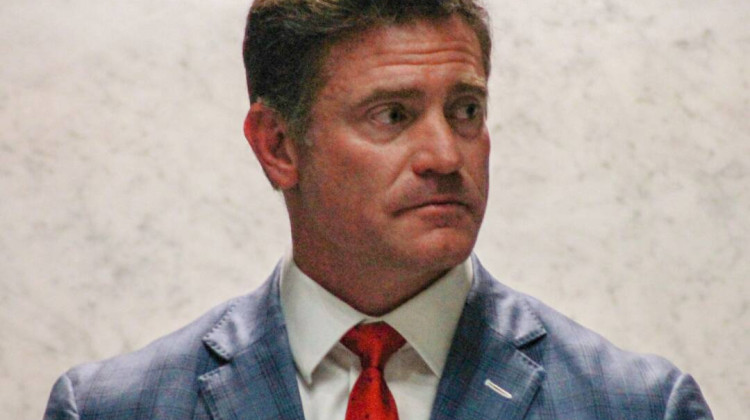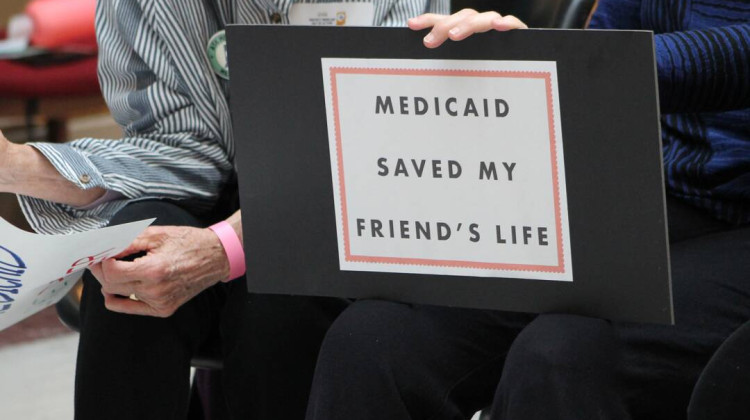
One of the policies lawmakers removed from House Bill 1003 would have require hospitals and facilities to charge the same prices for services regardless of the location.
Abigail Ruhman / IPB NewsA Senate committee amended a "comprehensive plan" meant to address health care costs in Indiana.
Lawmakers removed some of the more controversial policies in the process.
One of the policies lawmakers removed from House Bill 1003 would have require hospitals and facilities to charge the same prices for services regardless of the location.
Some hospital leaders criticized the language because it doesn't account for certain "regulatory requirements" for outpatient settings. The Senate health committee removed the language in favor of better defining sites of service. Lawmakers say the goal is to collect more information.
Sen. Tyler Johnson (R-Leo) said the changes build on policies Indiana already has in place rather than moving on to the "next step."
"We have hospitals better define their site of service by giving us a list of what locations they have in their place of service codes, which is something we're asking for in the bill in different place," Johnson said. "We're just doing it in a little different way."
Johnson said lawmakers want clarity on the different facilities that hospitals have and what those facilities do.
The Senate Health and Provider Services Committee also removed a policy that created strict guidelines for a federal program known as the 340B Drug Pricing program.
Under the program, covered entities — like hospitals and clinics — receive discounts on pharmaceutical drugs from manufacturers. They can then get a full reimbursement from a patient with insurance. Covered entities can use the difference to expand access to things like charity care or transportation. According to advocates, the proposed guidelines would have effectively ended that aspect of the program.
READ MORE: Several Indiana health care measures focus on the 340B Drug Pricing Program. What is it?
Originally, HB 1003 would have prevent hospitals from charging more than the discounted cost of the drug through the program — with an exception for the cost of running it.
Advocates with clinics said they were working with lawmakers to carve clinics out of that language. Clinics often have requirements through the federal programs they participate in to use money generated in the 340B program in specific ways before any state or federal funding can be used. Clinic advocates said that means the restriction originally in the bill could harm clinics more than hospitals. However, they said efforts to tailor the language weren't effective.
The bill's author said the policy was meant to create transparency around the program.
Johnson said lawmakers removed all 340B language from the bill, but there is still active legislation addressing transparency concerns lawmakers have with the program.
"Senate Bill 118 is out there and moving on the other—in the other chamber," Johnson said. "[We] feel like that language is good to go with as far as our transparency in the 340B language."
SB 118 focuses on increased reporting requirements for Indiana hospitals in the program.
Join the conversation and sign up for our weekly text group: the Indiana Two-Way. Your comments and questions help us find the answers you need on statewide issues, including our project Civically, Indiana and our 2025 bill tracker.
The committee also removed the policy in HB 1003 that prohibits health provider contracts from that prohibits health provider contracts from containing provisions with the intent to result in "anticompetitive effects."
Johnson said the language was vague.
In addition to removing policies, lawmakers clarified language on the surprise billing, good faith estimates and price transparency policies in HB 1003.
"We'd like to push patients to understand what they're paying for and why they're paying for it better," Johnson said.
Among the changes to these policies, lawmakers give hospitals more time to provide estimates of how much a hospital bill will cost. The original language required a good faith estimate for nonemergency health care service to be provided immediately.
"We don't want to make it immediate, because otherwise they just get a preprinted piece of paper that doesn't really tell you anything," Johnson said. "We want to give the facilities and the physician some time to give you a reasonable good faith estimate of what it's actually going to cost. That takes a minute."
Johnson said giving facilities and providers a day or two to provide that estimate seems reasonable.
The changes also give providers and facilities more time to provide patients a written list of services received and how much they intended to bill the patient. The original language said this had to be provided upon discharge.
"We don't want to delay people getting out of a facility, and it was very difficult to operationalize that on paper," Johnson said.
HB 1003 was presented as a part of the House GOP's priorities at the beginning of the legislative session.
Abigail is our health reporter. Contact them at aruhman@wboi.org.
 DONATE
DONATE






 Support WFYI. We can't do it without you.
Support WFYI. We can't do it without you.